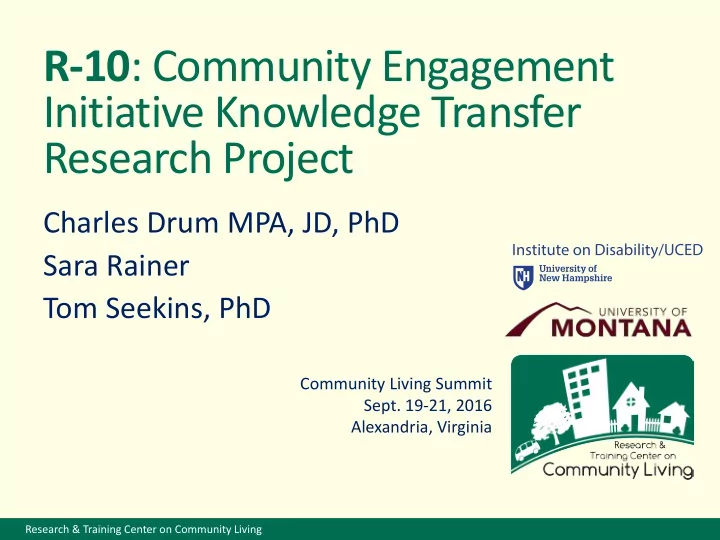

R-10 : Community Engagement Initiative Knowledge Transfer Research Project Charles Drum MPA, JD, PhD Sara Rainer Tom Seekins, PhD Community Living Summit Sept. 19-21, 2016 Alexandria, Virginia Research & Training Center on Community Living
Background • The Community Engagement Initiative (CEI) is an evidence-based technique to identify and resolve local barriers to health care and recreational opportunities Research & Training Center on Community Living
Four Phases of CEI Phase 2: Phase 1: Community Town Hall Collaboration Meeting Meeting Phase 4: Phase 3: Evaluation Mobilization Process Research & Training Center on Community Living
Aims • How much help do communities need to successfully implement CEI? • How many identified barriers will be resolved in nine months? • How & why do communities change or modify evidence-based techniques? Research & Training Center on Community Living
Methods • Pilot project using a cluster randomized controlled trial with equivalent materials design in eight communities (4 in NH & 4 in MT) Research & Training Center on Community Living
Progress to Date • 2 Minimal KT Assistance completed all 4 phases of CEI • 1 Moderate KT Assistance completed all 4 phases of CEI • 1 Minimal KT Assistance withdrawn Research & Training Center on Community Living
Community 1, Phase 4 Minimal KT Assistance • 5 prioritized barriers ̶ 3 transportation (2 HC, 1 R) ̶ 1 community design (R) ̶ 1 attitudes & communication (R) • 5 barriers resolved Research & Training Center on Community Living
Community 2, Phase 4 Minimal KT Assistance • 11 prioritized barriers ̶ 3 transportation (2 HC, 1 R) ̶ 4 community design (R) ̶ 2 attitudes & communication (R) ̶ 2 other (R) • 8 barriers resolved Research & Training Center on Community Living
Community 3, Phase 4 Moderate KT Assistance • 1 prioritized barrier ̶ Community design (R) • 1 barrier resolved Community 4, Withdrawn Moderate KT Assistance Research & Training Center on Community Living
Summary of Preliminary Findings • 178 participants across all sites • 14 of 17 prioritized barriers remediated in Phase 4 communities • 24 barriers prioritized in Phase 3 communities, results TBD Summary of Barriers (see handouts) Research & Training Center on Community Living
Potential Implications for Practice/Programs 1. Minimal KT Assistance sites changed the process the most • Minimal KT Assistance sites can be very successful or fail completely • Examples of changes to the process: • Combining Phase 1 & Phase 2 • Forming a committee to sustain CEI activities • Focusing solely on recreation Research & Training Center on Community Living
Potential Implications for Practice/Programs 2. Differential in # of prioritized & remediated barriers by level of TA • Minimal KT Assistance identified and prioritized more barriers than Moderate KT assistance • There may be a difference in barrier remediation by level of TA Research & Training Center on Community Living
Potential Implications for Practice/Programs 3. Differences among implementers • CILs, disability organizations, community based organizations, and local governmental agencies • Staff turnover may hinder or contribute to delayed implementation Research & Training Center on Community Living
Preliminary Implications for Policy 1. Continues to be a relatively non- adversarial way of addressing access barriers 2. Effective mechanism to increase awareness and endorsement of disability access needs 3. Process may have utility in addressing other access issues Research & Training Center on Community Living
Questions? Sara Rainer sara.rainer@unh.edu Charles Drum charles.drum@unh.edu Research & Training Center on Community Living
Recommend
More recommend